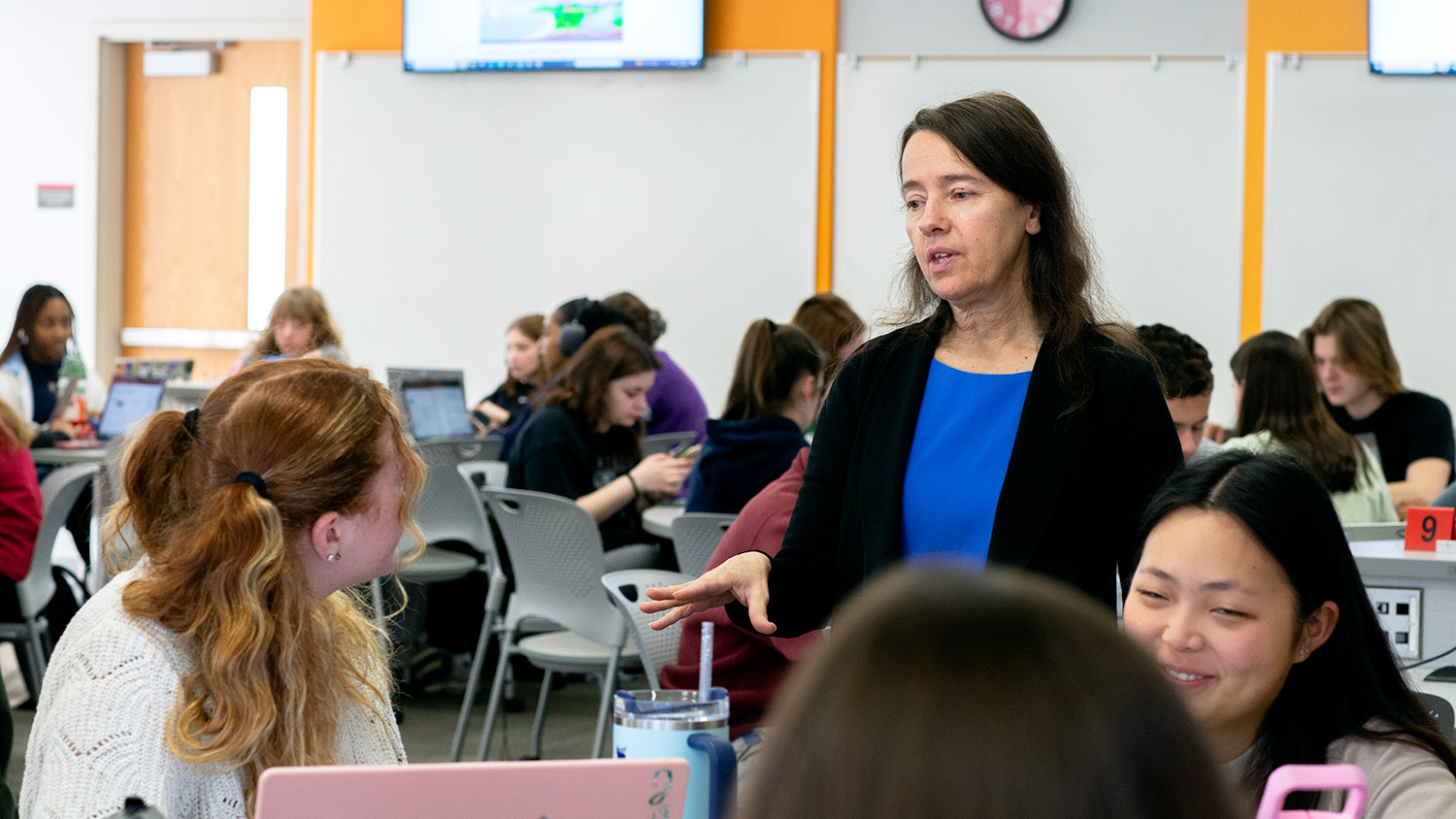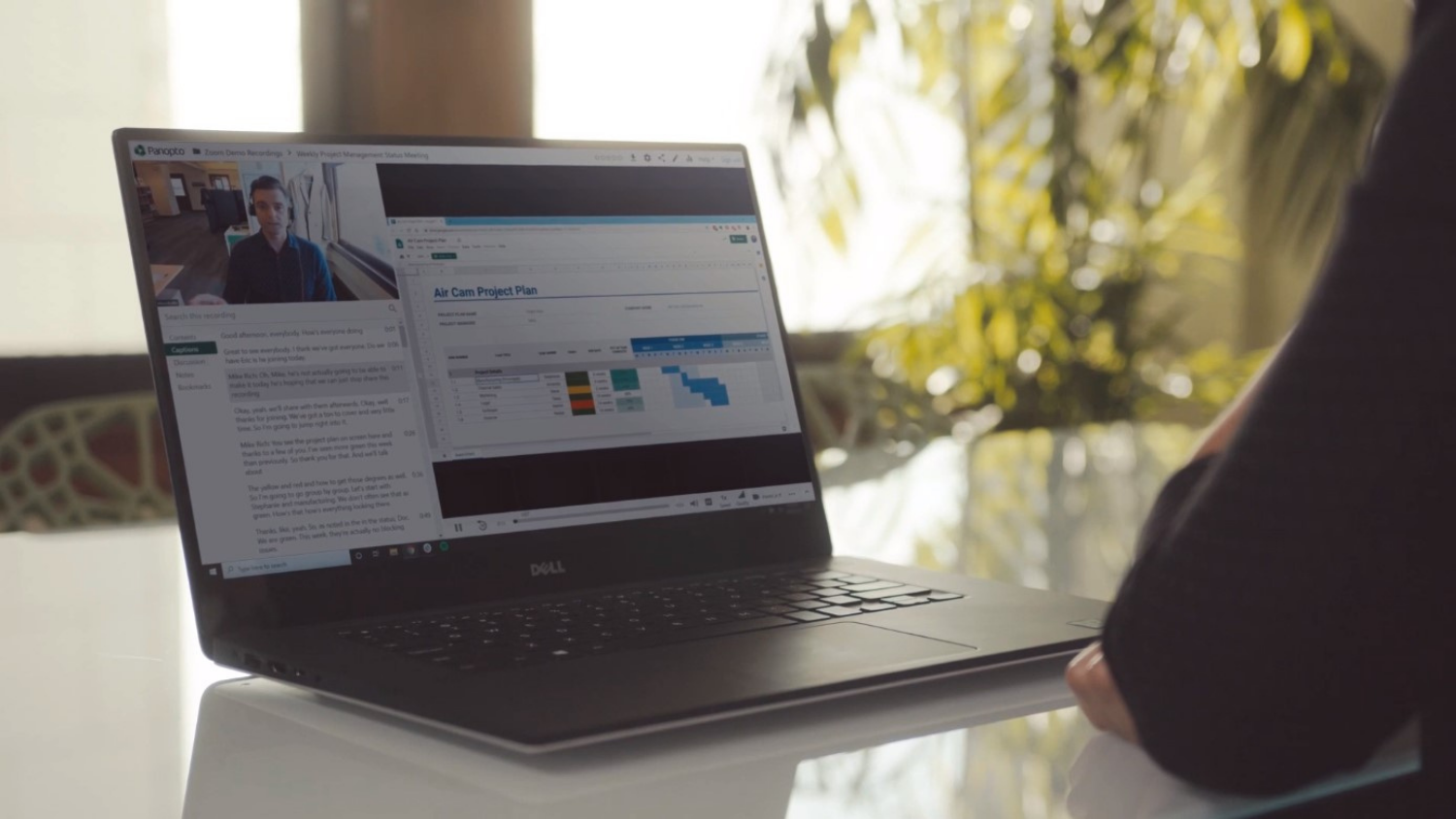DELTA Produced Virtual Tours Promote Exploration
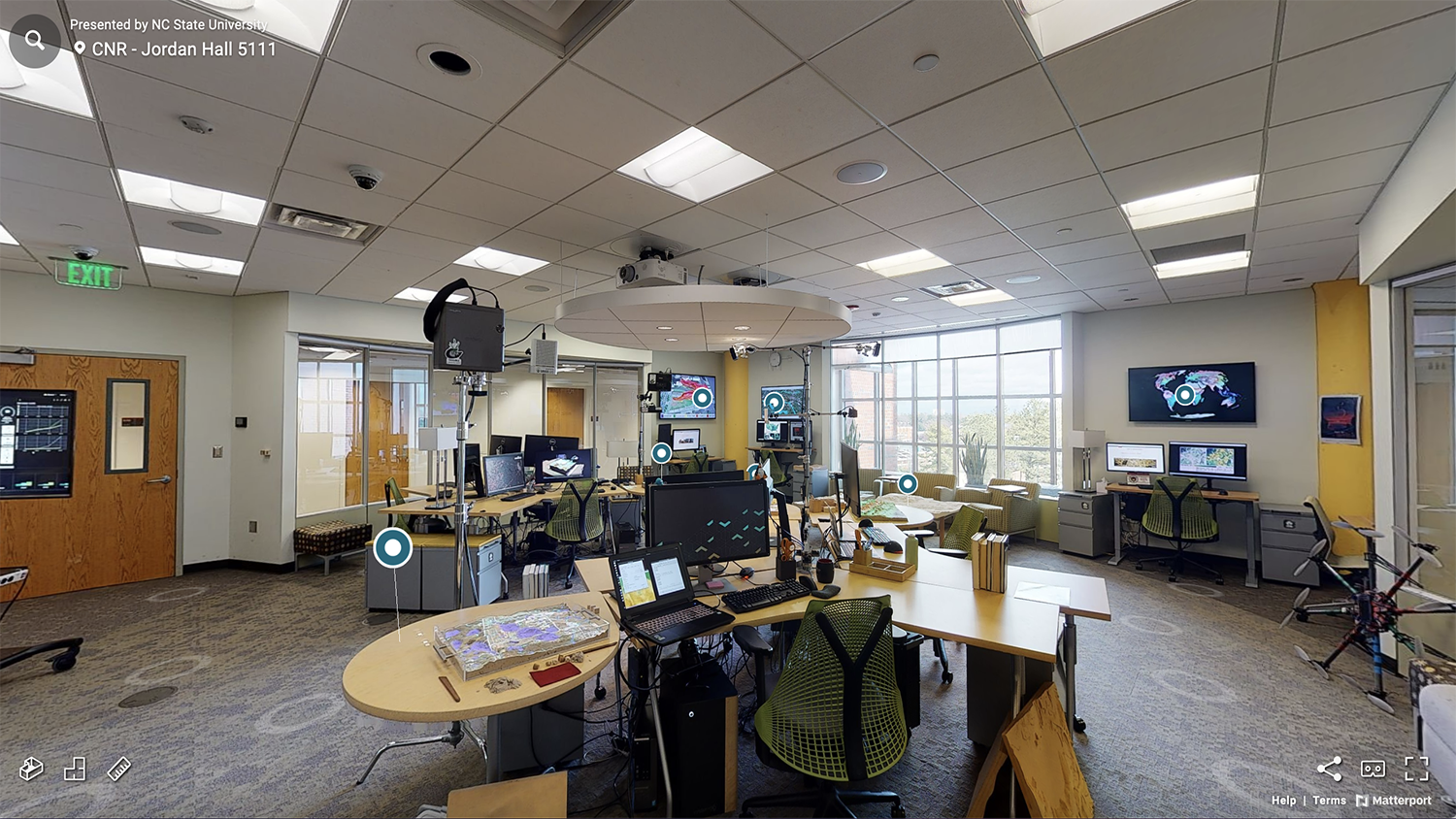
Learning techniques have gone through a transformation due to advances in technology and DELTA is at the forefront of embracing new concepts which foster student success. With this in mind, a new DELTA Express Grant was created for Virtual Tours in 2021-22. And, 10 virtual tours were produced as a result — some inside buildings and some in the great outdoors.
The Virtual Tours Express Grants builds on the previously established partnership with Academic and Student Affairs (DASA) and Exotic Animal Medical Service (EAMS) to pilot the use of the Matterport platform at NC State.
“The support from DELTA was excellent from start to finish — we were hesitant to apply for the grant as we were quite overloaded with other work. But, thanks to DELTA, the process was very efficient and the result exceeded our expectations,” said Associate Director of Earth and Environmental Sciences Applications at the Center for Geospatial Analytics Helena Mitasova.
As the old saying goes, “Not all those who wander are lost.” In fact, quite the opposite can be true. The virtual tours created by the DELTA team actually help students find their way while providing an immersive experience which they can explore from anywhere. They provide an inside look that is often actually more detailed than an in-person experience can provide.
The DELTA team who worked on this year’s virtual tours was comprised of Creative Director Mike Cuales, Program Coordinator for Digital Learning Jenn Scoggins, Multimedia Specialist Stephen Waddell, Instructional Media Producer Arthur Earnest, Assistant Director of Educational Media Donnie Wrights, Broadcast and Emerging Media Specialist Michael Castro, (retired) Lead Instructional Designer Cathi Dunnagan, Instructional Designer Caitlin McKeown and former College of Design student Aitch Hunt.
Spring 2022 Grant Produced Virtual Tours
Geospatial Analytics Geoviz Lab 5111 Jordan Hall
NC State’s Geovisualization Lab at the Center for Geospatial Analytics (CGA) houses state-of-the-art tools and technologies for interacting with and accurately representing spatial data collected through research, extension and teaching. Immersive virtual environments, collaborative touch-screen displays, 3-D imagery, and interactive decision-making systems allow users to visualize real-world locations and scenarios.
Associate Director of Earth and Environmental Sciences Applications Helena Mitasova applied for the DELTA Virtual Tour Grant of College of Natural Resources (CNR) Geoviz Lab 5111 Jordan Hall in order to:
- Allow for integration of cutting-edge, ongoing research examples into several on-campus and online courses where students would not otherwise have the opportunity to visit and/or use the lab. It would create a dynamic teaching tool that could be used across many of our GIS courses.
- Provide a unique way to engage prospective students with the ongoing research in CGA and give them a unique perspective on physical spaces they would have access to as a student (particularly Ph.D. students).
- Provide an alternative way to engage with potential research collaborators and others (such as K-12 groups) interested in CGA activities and partnerships. CGA has given up to 50 in-person tours each year in the past, and a virtual option would help keep engagement active (particularly during the pandemic or other times when in-person tours are not as feasible) while also freeing up valuable student and faculty time and being less disruptive to students who actively use the lab for research and teaching on a day-to-day basis.
Goose Creek State Park

Associate Professor Marcelo Ardon Sayao often discusses ghost forests in his class as an example of a very clear indicator of climate change. These watery remains of what used to be thriving woodland areas are a direct result of rising sea levels. Saltwater eventually overtakes the fresh water and slowly poisons deciduous trees leaving dead and dying gray colored trees behind.
Ardon applied for his virtual tour grant to offer his students an immersive opportunity much superior to still photographs or even a video. His ES 100: Introduction to Environmental Sciences course usually has 300 students enrolled in it. So, a field trip is out of the question. The Goose Creek State Park virtual tours which were produced offer a great experience for students in his class.
Links to Goose Creek State Park Virtual Tours:
NC State’s Compost Facility and Research Cooperative
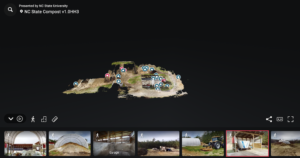
This impressive facility closes the loop with organic waste and sets NC State apart as a leader in sustainable waste management and organics diversion. The facility allows organic waste that is produced on campus to be processed on campus. After which, the final compost product is used in the campus landscape projects and at the Agroecology Farm to grow produce for the dining halls.
University Program Specialist Adam Bensley noted that the response to the pandemic prevented an open house at the facility in April of 2020 and since then, in-person engagement has been low. When he got numerous requests for virtual tours of the NC State Compost Facility and Research Cooperative, he applied for this grant. It is now used on the facility’s website as a resource. In addition, this tour was shared with instructors in the College of Agriculture and Life Sciences and the Department of Biological and Agricultural Engineering as well as the broader community in North Carolina.
Fall 2021 Grant Produced Virtual Tours
Charles Hall
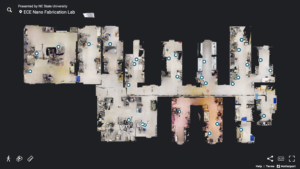
This impressive facility is not only home for various faculty members, the NC State Nanofabrication Facility (NNF) also serves as a melting pot for a community of top-notch researchers from academia, government labs and industry representing a variety of disciplines.
Assistant Professor Spyros Pavlidis captured low-grade 360° imagery as the COVID-19 pandemic began which was used as a way to demonstrate the facility to his electrical and computer engineering students. He also created explanatory videos.
The facility is complex as it is made up of several “rooms” within the cleanroom space. It was difficult to showcase all of the dedicated staff, protocols, unique nanofab, testing and analytic devices in an in-person teaching setting — and impossible in a remote setting.
The updated virtual tour of Charles Hall – Nanofabrication Lab created in the fall of 2021 presents an immersive environment and is available for all who wish to examine the intricacies of this unique space. In addition, it can be used as a “blank slate” in which content can be added — including video demonstrations of techniques and capability, technical webinars related to wide bandgap, semiconductor power devices, and circuit fabrication which can be utilized in both graduate-level classes, as well as high-level undergraduate classes.
Previous experiments have been performed by various faculty that use the NC State Nanofabrication Facility (NNF) in their daily work, finding ways to showcase the space, tools, techniques, and opportunities in an immersive and consumable fashion. The NNF provides users with a broad range of nanofabrication capabilities to support a diverse set of projects. The facility houses virtually all standard thin-film processing tools. The facility serves as a melting pot for a community of top-notch researchers from academia, government labs, and industry representing a variety of disciplines.
Dabney Hall Chemistry Lab
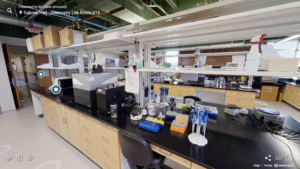
Professor and Director of Graduate Programs Reza Ghiladi noticed an unanticipated challenge the COVID-19 pandemic created. Prospective undergraduate student researchers were struggling to make informed decisions about which lab would be the best fit for their independent research projects.
The virtual tour of Dabney Hall – Chemistry Lab (Room 616) now provides students with an improved visual resource tool which helps them to identify which lab would best match their research interests. In turn, engagement and student success has increased because a good match fosters a clearer understanding of future path options — whether it be guiding them into a graduate program or identifying a job in a particular field.
In addition, the virtual lab tour provides the undergraduate researcher with a list of available equipment which is annotated with information on which companies in the Research Triangle Park, N.C., are looking for a trained researcher with skills acquired by learning how to use the equipment. It also provides information on which graduate programs have accepted previous undergraduate students based on their training in that lab. Lastly, it serves as a recruiting tool for use on our graduate program website.
Design Materials Lab
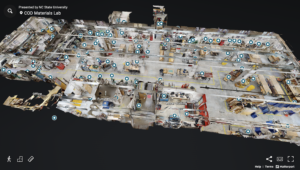
Special Trades Technician Christian Karkow aims to foster young innovation by equipping designers with giant machines needed to kickstart giant dreams. So, he applied for a virtual tour grant of the College of Design (COD) Materials Lab because it would provide his students with a highly engaging, highly accessible resource for safety training, information, and operation of the shop’s space and equipment.
This lab houses an impressive collection of heavy duty machinery, advanced technologies and elaborate configurations of studio space for the advancement of project design and development at NC State. The development of a virtually guided tour includes: basic safety training, equipment breakdowns and physical orientation of resources available. This has provided students the opportunity to acquire the knowledge, skills and the confidence needed for optimal engagement with the space and optimal utilization of the shop’s resources in a highly engaging, custom-built fashion.
Genomic Sciences Laboratory (GSL) Thomas Hall Main Lab
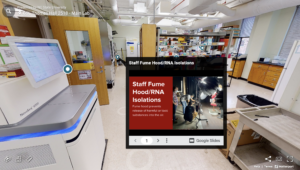
A group of instructors in the Department of Biological Sciences worked together to apply for a grant to create virtual tours of the MicroFACS Facility – Jordan Hall 1147 (fall of 2021) and Genomic Sciences Laboratory (GSL) – Thomas Hall 2518 – Main Lab (spring of 2022). The resulting virtual tours are now available to students in several courses with large enrollments.
Before virtual tours were an option, it was difficult for students to access these spaces due to the limited capacity of these facilities. Users can explore these core facilities and learn about high-end equipment that is used for sample preparation, sequencing, and sorting cells. The team is working with a student to include information about the equipment and its applications to train users from a variety of academic programs.
Associate Teaching Professor Carlos Goller, Assistant Teaching Professor Claire Gordy and Associate Teaching Professor Melissa Ramirez served as primary investigators for this project. They use these tours in conjunction with case studies to push students beyond learning to use the equipment and challenge them with real-world examples which help them to understand when and why the equipment is used.
In addition, they plan to make these tours and case studies as accessible as possible by including American Sign Language (ASL) interpretation, detailed audio descriptions and Spanish translation.
Industrial Design Space: 111 Lampe Drive
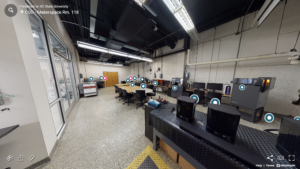
The focus of the new Makerspace in the College of Design is to bolster its ability to offer digital fabrication resources for use with the additive manufacturing technology and applications available to students. Technology Associate for Research and Scholarship William (Lee) Cherry believes the ability to have these resources at the heart of his curriculum instruction space allows direct access to real world resources. Also, it provides a seamless flow between the traditional open studio design concept with hands-on resources for making, crafting and prototype development.
The new industrial design space at the 111 Lampe Design Center integrates the Makerspace lab at the center of the studio surrounded by cluster computing labs along the periphery hallways. This presents a unique opportunity where undergraduate and graduate students have an opportunity to work within an open studio format alongside an open and integrated Makerspace.
The resulting virtual tours are the initial step to provide students virtual immersive access to the new technology platforms. This also allows them to participate in online certification videos/processes and visually plan their design workflow around the resources within the new space.
Links to Virtual Tours of Industrial Design Space – 111 Lampe Drive
- COD – Gallery Hall Entrance
- COD Makerspace (Room 118)
- COD Mixed Studio (Part 1)
- COD Mixed Studio (Part 2)
- COD – Computing Cluster (Room 108)
Want More Information on DELTA Express Grants?
Visit go.ncsu.edu/delta-express-grants for more information about each grant type and other important dates.
View our DELTA Express Grants FAQ page for information about grant eligibility, the review process and general inquiries. The proposal submission system opens Aug. 22 and closes on Sept. 16.
Email deltaexpressgrants@ncsu.edu with specific questions.

